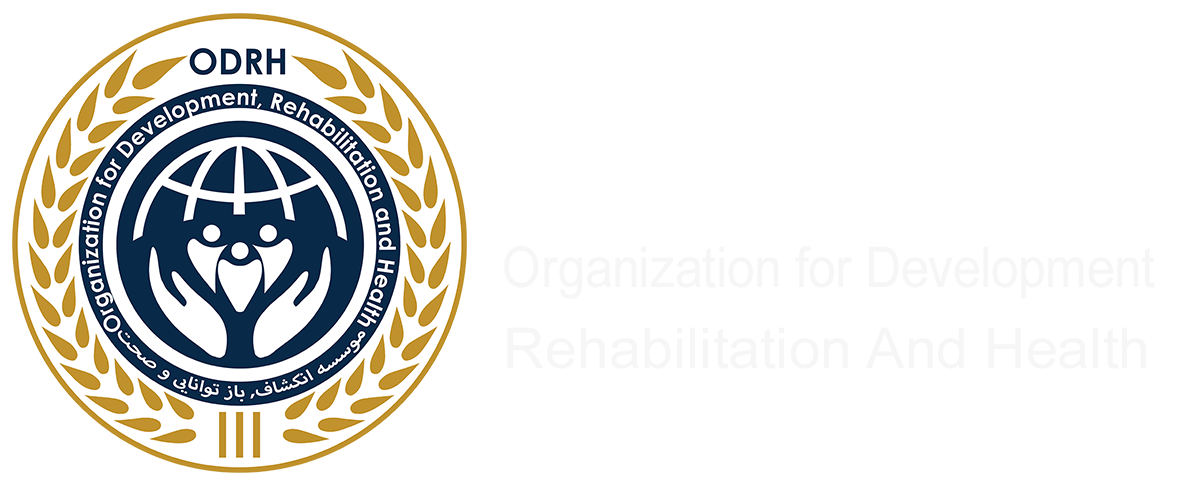Organization for Development Rehabilitation and Health





ODRH GOALS & OBJECTIVES

HUMANITARIAN PRINCIPAL

ODRH Commitment to Learning and Development
ODRH GOALS & OBJECTIVES
Overall Goal
To enhance the well-being, resilience, and rights of vulnerable and crisis-affected communities in Afghanistan through inclusive, rights-based, and sustainable humanitarian and development interventions.
Strategic Objectives
Improve Access to Quality Health and WASH Services
• Strengthen primary and community-based healthcare delivery systems.
• Promote public health awareness and disease prevention.
• Expand access to safe drinking water, sanitation, and hygiene education.
Promote Inclusive Education and Vocational Training
• Support formal and non-formal education for children, youth, and adults.
• Provide market-driven vocational skills training and life skills for economic empowerment.
• Reduce barriers to education for girls, women, and persons with disabilities.
Advance Gender Equality and Women's Empowerment
• Integrate gender mainstreaming and GBV prevention across all programs.
• Promote women’s leadership and participation in community development.
• Create safe spaces and support systems for survivors of GBV.
Strengthen Livelihoods and Food Security
• Support sustainable agriculture, livestock development, and rural entrepreneurship.
• Enhance household income through skills development and micro-enterprise support.
• Promote climate-resilient livelihoods and community resilience to shocks.
Ensure Protection and Social Inclusion of Marginalized Groups
• Advocate for the rights and protection of vulnerable populations, including women, children, and persons with disabilities.
• Strengthen community-based protection systems and referral mechanisms.
• Promote inclusive development that leaves no one behind.
Provide Timely and Coordinated Humanitarian Response
• Deliver life-saving assistance during natural disasters and conflict-related crises.
• Improve disaster preparedness and risk reduction at the community level.
• Collaborate with humanitarian clusters and actors for a coordinated response.
Foster Institutional Capacity and Good Governance
• Build the organizational capacity of ODRH staff and partners through continuous learning and training.
• Strengthen accountability, transparency, and results-based management practices.
• Institutionalize strong Monitoring, Evaluation, Accountability, and Learning (MEAL) systems.
Promote Evidence-Based Development and Innovation
• Conduct research and assessments to inform program design and policy advocacy.
• Leverage innovation and local knowledge to improve service delivery.
• Document best practices and lessons learned for replication and scaling.
HUMANITARIAN PRINCIPAL
The Organization for Development, Rehabilitation and Health (ODRH) is guided by a set of principles that underpin its commitment to delivering effective and ethical assistance.
Humanity
The Organization for Development, Rehabilitation and Health (ODRH) is guided by a set of principles that underpin its commitment to delivering effective and ethical assistance.
Impartiality
Assistance must be provided based on need alone, prioritizing those who are most in need without regard to nationality, race, religion, gender, or political affiliation.
Neutrality
Humanitarian actors must not take sides in hostilities or engage in controversies of a political, racial, religious, or ideological nature. This allows them to assist without risking safety or access.
Independence
Humanitarian action must be autonomous from political, economic, military, or other objectives. This ensures that aid is delivered based solely on humanitarian needs.
ODRH Commitment to Learning and Development
ODRH is deeply committed to continuous learning and development as a cornerstone of organizational growth, program effectiveness, and community impact. The organization prioritizes building the capacity of its staff, partners, and stakeholders through regular training, mentorship, and skills enhancement opportunities. This includes targeted workshops on humanitarian principles, protection, gender mainstreaming, financial management, MEAL (Monitoring, Evaluation, Accountability, and Learning), and technical sector-specific knowledge. ODRH also encourages peer-to-peer learning, reflection sessions, and knowledge exchange forums to foster a culture of innovation and collective improvement. By integrating feedback loops, conducting after-action reviews, and using data for adaptive decision-making, ODRH ensures that lessons learned are systematically applied to strengthen future programming. Through this holistic approach, ODRH empowers its teams to lead with confidence and deliver high-quality, accountable, and contextually relevant services to communities in need.
How TO Upholds Its Commitment to Learning and Development
Regular Capacity Building Workshops
Organizes internal and external training on humanitarian principles, sectoral skills (health, education, protection, etc.), and cross-cutting themes like gender and inclusion.
On-the-job mentoring and Coaching
Provide individualized guidance and support to staff members through mentorship programs and team-based learning.
Staff Development Plans
Develops annual professional development plans tailored to each team member’s role and growth potential.
Knowledge Sharing Forums
Hosts reflection meetings, learning reviews, and cross-project exchanges to share lessons learned and innovative practices.
MEAL Integration
Embeds Monitoring, Evaluation, Accountability, and Learning systems in all projects to promote adaptive learning and evidence-based improvement.
After-Action Reviews and Feedback Loops
Uses real-time feedback and post-implementation reviews to analyze successes and gaps for continuous improvement.
Encouragement of Peer Learning
Fosters a collaborative work culture where team members learn from each other through group problem-solving and knowledge exchange.
Partnership Learning Initiatives
Collaborates with local NGOs, INGOs, and government agencies to participate in joint training and shared learning experiences.
